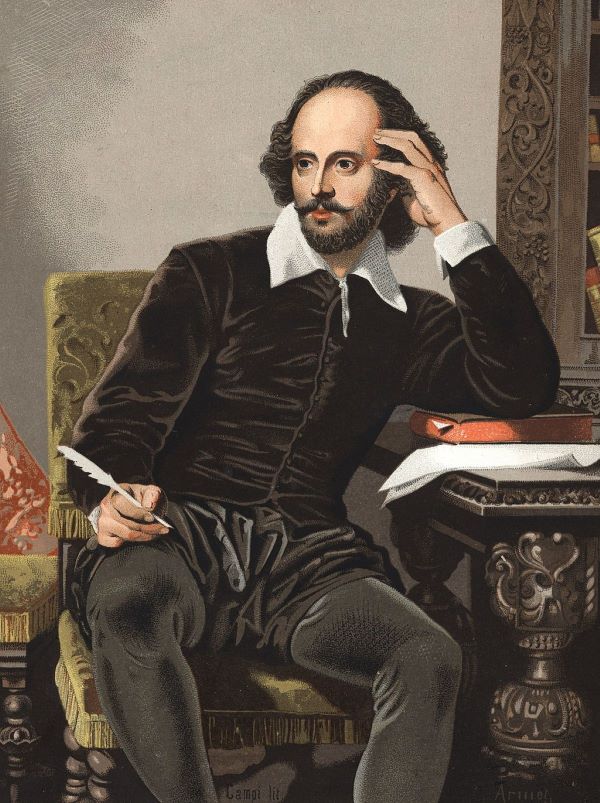Liberty Matters
Reason and Grace
 In "Power, Character, and Disorder," John Alvis responds to me in part by writing that Prospero "attributes his relenting to 'reason' rather than to 'grace.'" Here, it seems that Alvis sets up a false dichotomy between reason and grace, a dichotomy contradicted by many writers in the tradition of liberty, a dichotomy I suspect Alvis himself does not really affirm.
In "Power, Character, and Disorder," John Alvis responds to me in part by writing that Prospero "attributes his relenting to 'reason' rather than to 'grace.'" Here, it seems that Alvis sets up a false dichotomy between reason and grace, a dichotomy contradicted by many writers in the tradition of liberty, a dichotomy I suspect Alvis himself does not really affirm. The scene to which Alvis refers takes place within this exchange between Prospero and his spirit servant, Ariel:
Prospero: Say, my spirit, How fares the king and’s followers?Ari.Confin’d together In the same fashion as you gave in charge, Just as you left them: all prisoners, sir, In the line-grove which weather-fends your cell; They cannot budge till your release. The king, His brother, and yours, abide all three distracted, And the remainder mourning over them, Brimful of sorrow and dismay; but chiefly Him, that you term’d, sir, ‘The good old lord Gonzalo:’ His tears run down his beard, like winter’s drops From eaves of reeds; your charm so strongly works them, That if you now beheld them, your affections Would become tender.Pro.Dost thou think so, spirit?Ari.Mine would, sir, were I human.Pro.And mine shall. Hast thou, which art but air, a touch, a feeling Of their afflictions, and shall not myself, One of their kind, that relish all as sharply, Passion as they, be kindlier mov’d than thou art? Though with their high wrongs I am struck to the quick, Yet with my nobler reason ’gainst my fury Do I take part: the rarer action is In virtue than in vengeance: they being penitent, The sole drift of my purpose doth extend Not a frown further. Go, release them, Ariel. My charms I’ll break, their senses I’ll restore, And they shall be themselves.(The Tempest, 5.1.6-31)
Significantly, it is the spirit Ariel who urges Prospero to refrain from wrath against his enemies, upon which he speaks the above words concerning his "nobler reason 'gainst my my fury / Do I take part." The play's context makes clear that Prospero's "nobler reason" was inspired by the grace urged and represented by Ariel, called by Maurice Hunt "a grace-giving Spirit" who "shar[es] tenderness with Prospero so as to soften his heart."[35]
And the idea that grace often works hand in hand with reason is commonplace in the Christian tradition of liberty. Consider first Dante's Divine Comedy. Early in the Inferno, the character Dante, lost and hopeless in the dark woods, meets with Virgil, who represents reason but who, like and even more explicitly than Shakespeare's Ariel, is an instrument of grace. During their initial encounter, Virgil tells Dante that he has been sent by God in response to the prayers of Mary, Lucia, and Beatrice.[36]
Dante, of course, was inspired by Aquinas, and I commend readers to Aquinas's Summa Theologica, part I, question 12, article 13, which says in part: "... human knowledge is assisted by the revelation of grace. For the intellect’s natural light is strengthened by the infusion of gratuitous light; and sometimes also the images in the human imagination are divinely formed, so as to express divine things better than those do which we receive from sensible objects, as appears in prophetic visions; while sometimes sensible things, or even voices, are divinely formed to express some divine meaning."[37]
And Calvin puts forward a similar position when, explicitly drawing upon Augustine, he writes, "It is a faculty of the reason and the will to choose good with the assistance of grace."[38]
Finally, consider the opening chapter of Isaiah, in which God calls to Israel, "Come now, and let us reason together, saith the Lord: though your sins be as scarlet, they shall be as white as snow; though they be red like crimson, they shall be as wool" (1:18).[39] Here the Author of Grace explicitly appeals to his audience's reason in a way that resembles Ariel's plea to Prospero.
Endnotes
[35.] Maurice Hunt, "Shakespeare's The Tempest and Human Worth," Ben Jonson Journal 20.1 (2013): 58-71 at 65.
[36.] See Canto 2, lines 49-117, in The Divine Comedy of Dante Alighieri. The Italian Text with a Translation in English Blank Verse and a Commentary by Courtney Langdon, vol. 1 (Inferno) (Cambridge: Harvard University Press, 1918). English version.
[37.] Aquinas, Thirteenth Article. WHETHER BY GRACE A HIGHER KNOWLEDGE OF GOD CAN BE OBTAINED THAN BY NATURAL REASON? in The “Summa Theologica” of St. Thomas Aquinas. Part I QQ I.-XXVI. Literally translated by Fathers of the English Dominican Province. Second and revised edition (London: Burns Oates and Washbourne, 1920). Vol. 1. </titles/1979>.
[38.] John Calvin, Institutes of the Christian Religion II.ii.4. In the edition on the OLL the phrase is "It is a power of reason and will to choose the good, grace assisting”. See, John Calvin, The Institutes of the Christian Religion, trans. Henry Beveridge (Edinburgh: Calvin Translation Society, 1846). 2 volumes in 1. </titles/535#Calvin_0038_905>.
[39.] The Parallel Bible. The Holy Bible containing the Old and New Testaments translated out of the Original Tongues: being the Authorised Version arranged in parallel columns with the Revised Version (Oxford University Press, 1885). </titles/2361>.
Copyright and Fair Use Statement
“Liberty Matters” is the copyright of Liberty Fund, Inc. This material is put on line to further the educational goals of Liberty Fund, Inc. These essays and responses may be quoted and otherwise used under “fair use” provisions for educational and academic purposes. To reprint these essays in course booklets requires the prior permission of Liberty Fund, Inc. Please contact oll@libertyfund.org if you have any questions.